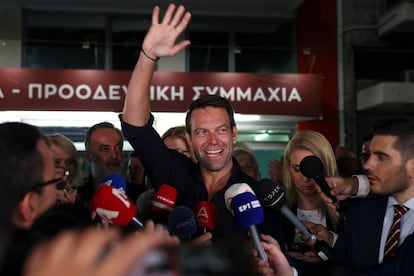Gay, liberal and a former Goldman Sachs executive: The unusual profile of the man who aspires to lead a renewed Syriza in Greece
The unknown Stefanos Kasselakis will face the leadership race favorite on Sunday after overtaking her in the first round of the Greek leftist party’s primaries


After the poor result of the elections on May 21, the leader of the Greek opposition and former prime minister Alexis Tsipras conveyed a very clear message to his leftist Syriza party. “If I resign, I will name Effie Achtsioglou as my successor,” he said, according to this newspaper’s sources inside the party. It was not an official announcement, but all parts of Syriza interpreted it as such. Achtsioglou also believed it too, and began preparing for the position. But in Greece, what is planned almost never happens.
In recent weeks, a practically unknown name has emerged: Stefanos Kasselakis. He is an elegant 35-year-old Greek citizen who was raised in the United States, a former Goldman Sachs executive, and a collaborator with Joe Biden’s Democratic Party. As if that were not enough, he is the son of a shipowner and CEO of a shipping company, with all the symbolic weight that that implies in Greece. None of these attitudes chime with the traditional Syriza voter, nor with the Greek left in general. He is too urban for the socialists of PASOK and too liberal for the KKE communists. Altogether too modern. But his supporters believe that that is his main virtue: he does not fit, he is disruptive, and he is something new.
And on Sunday, something upset the apple cart: Kasselakis overtook Achtsioglou in the first round of the party’s primaries. The newcomer received 44.9% of the members’ votes, nine points more than the woman who seemed destined to succeed Tsipras. The two will face off next Sunday to decide who leads the Greek opposition and the main left-wing party.

Until last Sunday, Achtsioglou seemed the consensus figure. A 38-year-old lawyer, she has been active on the left since she was a teenager and counts as her main merit having been Minister of Labor in Tsipras’ cabinet, a difficult position from which she emerged successfully. At the recent party congress, she presented a program for a new left-wing government, which the local media highlighted was detailed and coherent. A young woman with experience and with support from all sectors of the party, she had everything in her favor. Until Kasselakis arrived.
Back to the tie that Tsipras threw away
In 2015, at the height of the euro crisis, European Union partners — and especially the then-Chancellor of Germany Angela Merkel — pressured Tsipras to make savage spending cuts. The young Greek leftist was then forced to renounce many of his principles. But he remained firm on symbolic issues, such as never wearing a tie. The winner in the first round of the primaries, however, dresses in tailored suits and is not averse to perfectly tight Windsor knots on expensive shirts.
Nor is he shy about defending topics that until recently were taboo among Greek progressives: he wants Greece to be a secular country in which the state is separated from the church. He wants LGBTQ+ people to be able to get married and adopt children. He also wants the army to be professional, in a country where the left has never stood out for its criticism of military service, which is still in force. He wants to end the hand in glove relationship between the government and large companies. His critics accuse him that his manifesto is too generic and never gives specifics.
The new “it” man of the Greek left has received homophobic insults, innuendos, and scorn since he presented his candidacy. From both the political right and the left, they are not very different from the insults, insinuations, and sexist putdowns that have peppered criticism of Achtsioglou.
Kasselakis is new, but he is not alone. He returned from the U.S. with his husband to run for Syriza in the June elections, but was not elected. From the beginning, his main public supporter has been former minister Pavlos Polakis. But his most important supporters are those who were not seen at first glance: the candidate’s main advisor is the parliamentary deputy Giorgos Tsipras, brother of Alexis, the former prime minister. After the victory in the first round of the primaries, Giorgos Tsipras and figures very close to his brother have decided to show their support in public.
More and more voices in the party claim that, in reality, Alexis Tsipras himself is the one promoting Kasselakis’ candidacy, although officially he remains neutral. Sources familiar with the renewal process affirm that the former president’s predisposition for the new candidate is not due to internal reasons, but rather because he would have a greater chance of defeating the current prime minister, the conservative Kyriakos Mitsotakis. It is not that Tsipras is now against Achtsioglou, but that he considers that she does not represent a sufficient break from the status quo.
The repeat elections in June were painful for Syriza. New Democracy swept to power with 40.5% of the votes, while the left-wing party only got 17.8%. Tsipras had to resign and left quietly. He spent a long time in the United States.
Kyriakos Mitsotakis, the conservative prime minister, does not just have a comfortable absolute majority in parliament. He also enjoys firm media, cultural, and political hegemony. Partly thanks to their own merits, but also due to the weakness of the left. Kasselakis’s supporters do not so much seek to solve the problems of the progressive camp, but rather to find a kind of “left-wing Mitsotakis” who can challenge the conservatives in the government face to face. According to them, the paradox is that whoever wants to be the new Tsipras will have to be totally different from Tsipras. And by that reasoning, Kasselakis seems like the perfect candidate.
Effie Achtsioglou did not believe that this type of progressivism could find sufficient support on the Greek left. She was so sure of it that she could not even hide her anger with the result of the first round in the primaries, and declared that the voters did not know what they had voted for. Achtsioglou stated that a debate between the two was necessary to clarify which proposals the militants are choosing. Kasselakis, as if he were an aikido fighter, channeled his opponent’s blow and returned it with more force: “It’s time to stop fighting among ourselves and fight against Mitsotakis.”
The differences seem to be so great, not only in their manifestos but also in the political culture, that there are rumblings of a split if Kasselakis wins. It wouldn’t be the first time in Syriza. The truth is that whoever wins next Sunday will face a difficult scenario. On October 8 there are municipal elections and New Democracy aims to hammer the left again. It’s not an easy way to start.
Sign up for our weekly newsletter to get more English-language news coverage from EL PAÍS USA Edition
Tu suscripción se está usando en otro dispositivo
¿Quieres añadir otro usuario a tu suscripción?
Si continúas leyendo en este dispositivo, no se podrá leer en el otro.
FlechaTu suscripción se está usando en otro dispositivo y solo puedes acceder a EL PAÍS desde un dispositivo a la vez.
Si quieres compartir tu cuenta, cambia tu suscripción a la modalidad Premium, así podrás añadir otro usuario. Cada uno accederá con su propia cuenta de email, lo que os permitirá personalizar vuestra experiencia en EL PAÍS.
¿Tienes una suscripción de empresa? Accede aquí para contratar más cuentas.
En el caso de no saber quién está usando tu cuenta, te recomendamos cambiar tu contraseña aquí.
Si decides continuar compartiendo tu cuenta, este mensaje se mostrará en tu dispositivo y en el de la otra persona que está usando tu cuenta de forma indefinida, afectando a tu experiencia de lectura. Puedes consultar aquí los términos y condiciones de la suscripción digital.








































